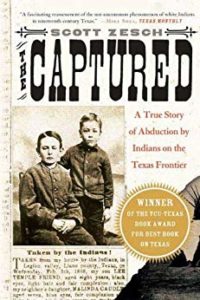Scott Zesch has written an ambitious, well researched and thoroughly documented account of nine children captured by Southern Plains Indians in the 1870s. I found The Captured fascinating in its detailed account of the mind-set of German settlers on the Texas frontier and the children’s reactions to being captured.
As author Zesch researched the story of his great-great-great-uncle Adolph Korn’s capture, he uncovered eight other incidents of captured children.
The children ranged in age from eight to fourteen when they were captured during Indian raids on their homesteads. Adolph Korn was herding sheep with his twin brother when they were accosted by an Apache raiding party. His brother managed to escape, but Adolph was taken. After several days of non-stop riding, he and his captors reached an Apache village. He was soon traded to the Comanches.
Other children had similar stories, many with grim details of their witnessing gruesome deaths of family members. In these particular accounts, all of the girls taken still happened to be very young, while most of the boys were older.
Most of the children were recovered with the help of U.S. Army soldiers or Indian agents, some within months, others after a few years. Surprisingly, most of the captured children spoke highly of their Indian “families” after the initial settling-in period. None of the girls spoke of sexual mistreatment.
Many of the captured boys thrived in their new environment and many resisted returning home once they were discovered. The nomadic life seemed more attractive than the endless, thankless toil of ranching and farming. With the Indians they were given the freedom to ride horses, hunt, and practice fighting skills. Many were involved in raids; some witnessed horrific sights, both from Indians slaughtering the whites in retaliation for taking their land, and from Army soldiers destroying Indian villages, killing men, women and children.
The Captured was an eye opener in many respects. Zesch’s thorough research follows each child’s capture, return to family, and how they managed life after returning home. Some made good adjustments; some longed for the carefree nomadic life they once had. Many of the captured lost their German or English native language and could speak only an Indian dialect when they returned home.
The last third of the book is detailed documentation of the nine children and the author’s many research references, both in written records and in discussions with elder Indians and descendants of those captured. The Captured is a engrossing book that I highly recommend.



Mary:
This sounds like a book filled with surprises. As usual, you manage to tell just enough to catch my attention and then I must put this on my to-do-list.
It IS full of surprises, issues I’d never thought of before.
Mary, your reviews are always so fascinating that I want to read every book you mentioned in your blogs. Truly, you should have been the book reviewer for the New York Times or some other august newsprint.
Thank you, Patricia. I enjoy reviewing books. I find I read more thoroughly knowing I’ll be writing a review.